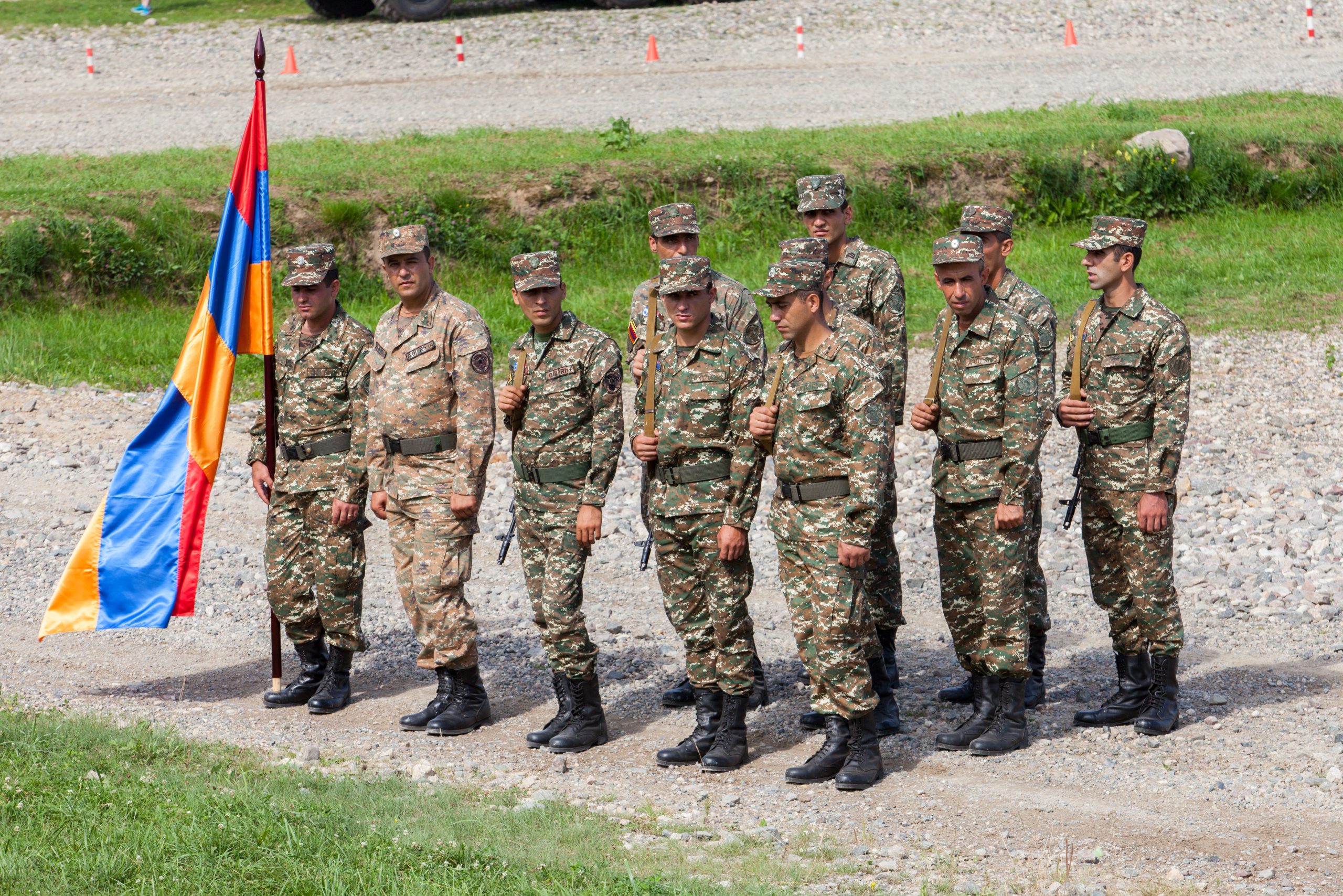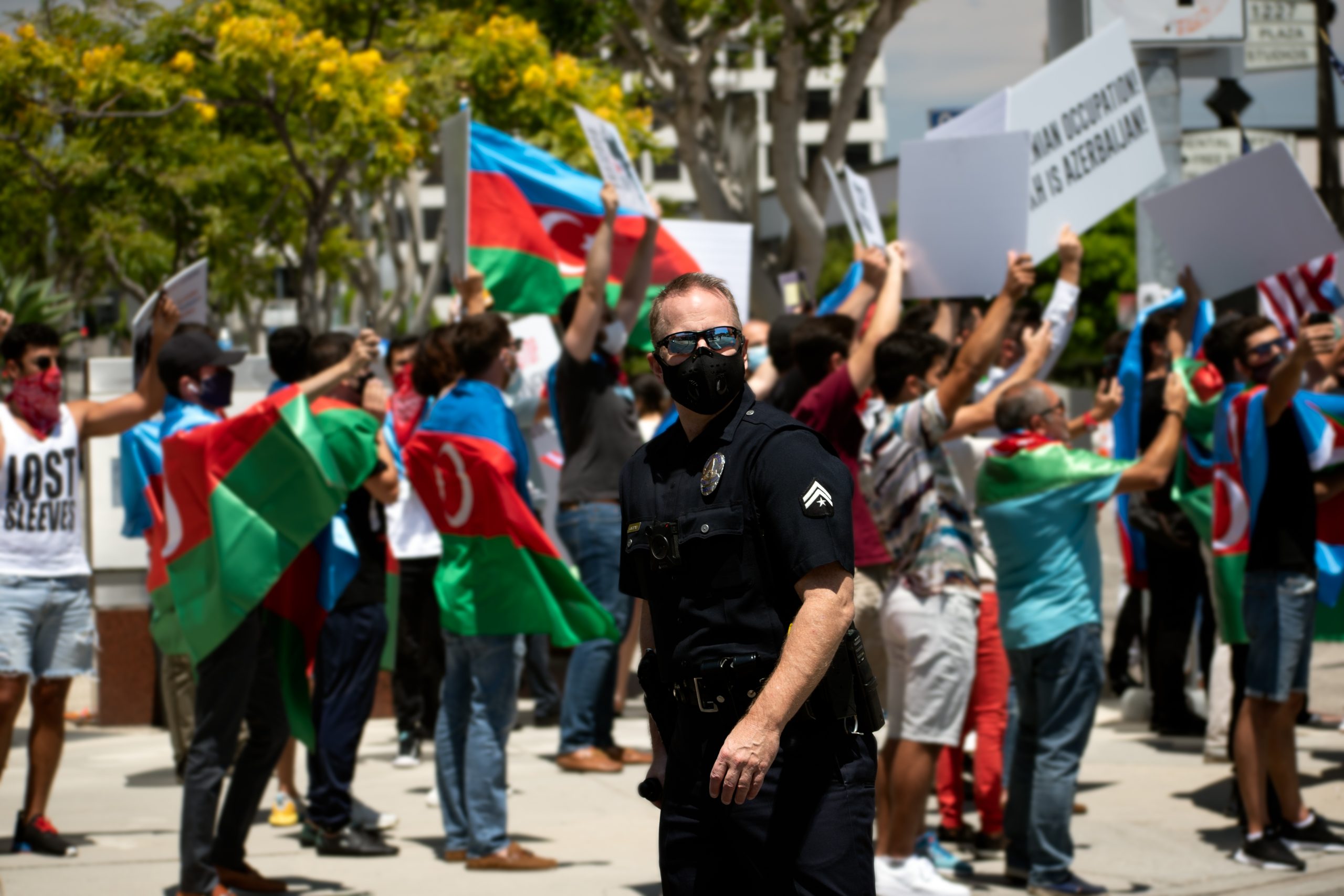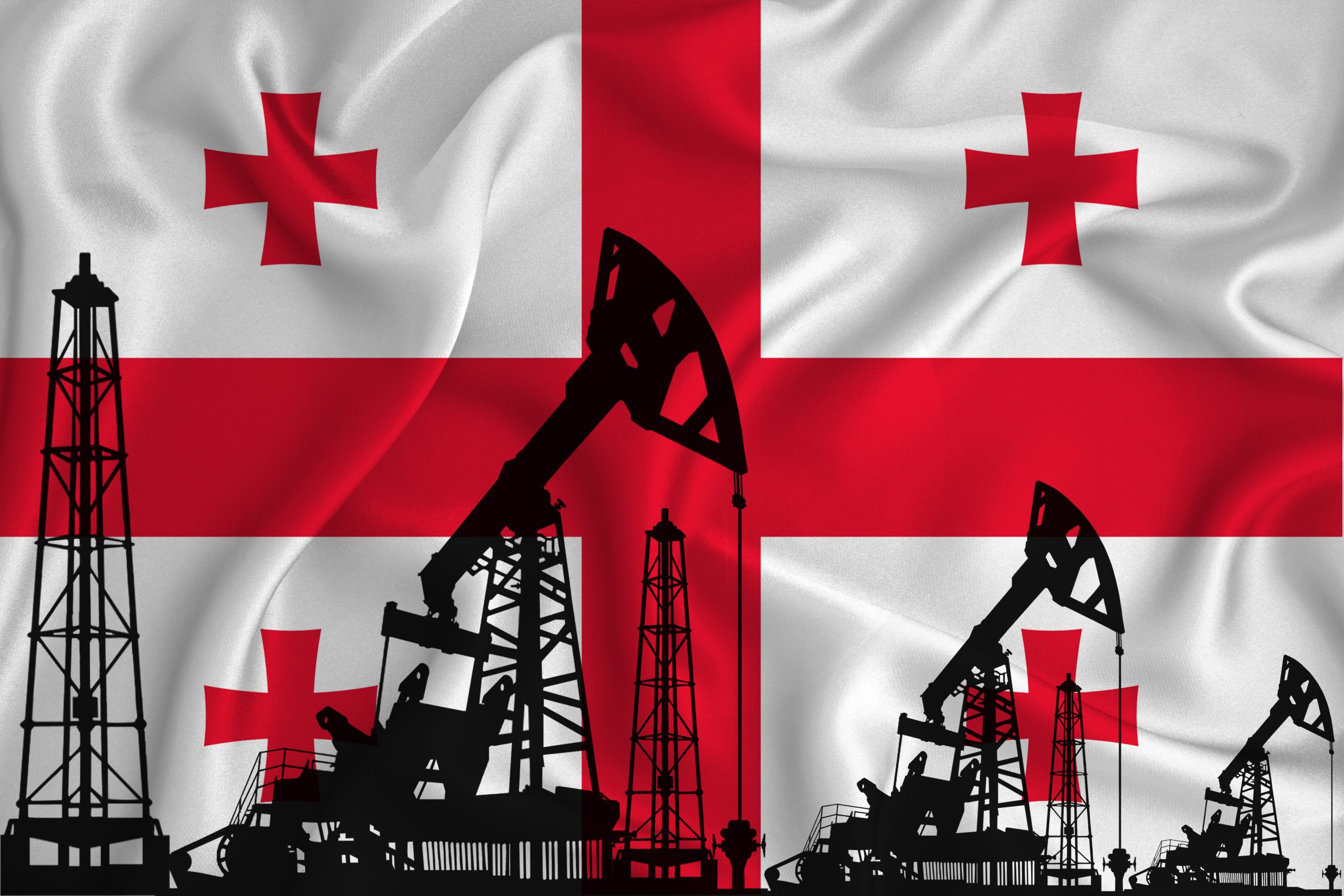Strategic Analysis Caucasus Brief
Bi-weekly review (12.-26. 7. 2020)
Tomáš Baranec
Armenia

Armenian Military, Photo: SemikArt / Shutterstock.com
MAIN STORY
Tensions on the Armenian-Azerbaijani border escalated into bloody clashes
Between July 12 – 16, 2020 the decades-long conflict between Armenia and Azerbaijan escalated into serious military clashes along the state border straddling Azerbaijan’s Tovuz and Armenia’s Tavush regions. The fighting involved heavy artillery as well as aerial drones and claimed the lives of approximately 16 people on both sides, including an Azerbaijani civilian and two-star general along with the destruction of infrastructure in the border region. On July 13 two sides also reportedly fought along with Azerbaijani exclave of Nakhchivan. By July 17 relative calm returned to the border, although both sides claimed continuous violations of the ceasefire.
On the same day, Vagif Dargyakhly, the press spokesperson for the Azerbaijani defence ministry, threatened Yerevan with the strike on the Armenian nuclear power plant at Metsamor, if the conflict escalates further. This statement was a reaction to an earlier warning by retired Armenian general Ter-Tadevosyan about a possible rocket attack on Azerbaijani Mingachevir reservoir.
Azad Garibov, an independent analyst, mentioned for the Jamestown Foundation three novelties the latest clashes brought to the old conflict between Armenia and Azerbaijan. First is the fact that clashes occurred directly on the border between both countries, rather than around the Armenia-controlled Karabakh. The second novelty has been the popular reaction to the hostilities in the form of mass rallies in Azerbaijan, where several thousand protesters broke into the building of the parliament in Baku calling for a war with Armenia. The last novelty is the unusually high proportion of high-ranking officers among the fallen soldiers—an Armenian major and colonel and an Azerbaijani two-star general and colonel. As Garibov claims, this is a result of rising sophistication and firepower of the weaponry deployed by both sides relying on precision-guided missiles, drones, and radars.
It is still unclear which side fired the first shot and what was the chain of events leading to the bloodiest confrontation on the Armenian-Azerbaijani border in decades since the end of Nagorno Karabakh war in 1994.
Some Azerbaijani experts claimed that Yerevan tries to provoke open hostilities on the common border in an attempt to lay the ground for the involvement of the Moscow-led Collective Security Treaty Organization (CSTO) in the conflict. Other analysts suspect that Baku wanted to generate a “rally around the flag” effect and/or to express its growing discontent with the peace process regarding the Nagorno Karabakh, while yet others believe that clashes were a result caused by mistake on the ground, without involvement from the governments.
Azerbaijani journalist Shahin Rzayev stressed in his Op-ed for JAM News the fact that “Armenian-Azerbaijani border is not delimited and there are quite extensive neutral zones where, apparently, the Azerbaijani posts moved forward “. As he added, this continued until July 2020, when, “unexpectedly, the Armenian side took the same step and established its post between two Azerbaijanis positions “. He, however, rebuffed claims that Azerbaijani UAZ tried to cross the state border as extremely unlikely.
Regarding the impact of recent clashes on the future relationship between both rivals, Emil Souleimanov, Associate Professor on Charles University in Prague, argued, in an interview for the Strategic Analysis, that although Azerbaijani Government does not wish for full-scale war with Armenia, Baku is also not interested in the status quo and it has been quite willing to poke Armenian forces either on the Armenian-Azerbaijani border or around the Nagorno Karabakh.
This, in combination with Davit Tonoyan’s doctrine in Armenia, calling for asymmetric retaliation on any Azerbaijani attacks, might lead to increased frequency of escalations on the Armenian-Azerbaijani border leading to an increasing number of causalities. Although neither side wishes for open war, “escalation between Armenia and Azerbaijan is more likely now“, said Souleimanov. If one side would suffer significant causalities, this losing side would probably respond by excessive violence to restore the balance of losses, “which might pave the way to open war“, added the analyst.
Sources:
- JAMNews, Op-ed: what really happened in the July fighting between Armenia and Azerbaijan, what are the results?, https://jam-news.net/op-ed-what-really-happened-in-the-july-fighting-between-armenia-and-azerbaijan-what-are-the-results/
- Jamestown.org, Armenian Nuclear Power Plant Able to Withstand Attack, Russian Security Expert Claims, https://jamestown.org/program/armenian-nuclear-power-plant-able-to-withstand-attack-russian-security-expert-claims/
- Jamestown.org, Renewed Armenian-Azerbaijani Fighting Threatens to Escalate Further, https://jamestown.org/program/renewed-armenian-azerbaijani-fighting-threatens-to-escalate-further/
- Jamestown.org, What Is New in the Latest Armenian-Azerbaijani Conflict Escalation? https://jamestown.org/program/what-is-new-in-the-latest-armenian-azerbaijani-conflict-escalation/
- www.strategicanalysis.sk, Armenia – Azerbaijan Feud at International Level, https://www.strategicanalysis.sk/strategics-interview-with-emil-aslan-souleimanov/?fbclid=IwAR1OGxQAxmPV2ecAYX6VuWA4GDLGjdapgtJs_oG7ulBewAiSvMLS1yiZG8k
For additional information, see:
- Eurasianet.org, Armenia, Azerbaijan see mirror images in conflict, https://eurasianet.org/armenia-azerbaijan-see-mirror-images-in-conflict
- Eurasianet.org, Armenian opposition unites around army, snipes at PM, https://eurasianet.org/armenian-opposition-unites-around-army-snipes-at-pm
- Carnegie Endowment for International Peace, Behind the Flare-Up Along Armenia-Azerbaijan Border, https://carnegieendowment.org/2020/07/22/behind-flare-up-along-armenia-azerbaijan-border-pub-82345
Pro-war protests in Azerbaijan spun out of control
Pro-war protests in Baku spun out of control on the night from July 14 – 15, after several thousand protesters broke into the building of the parliament. Although police managed to chase protesters away by tear gas, riot illustrates how difficult it will be for Azerbaijani authorities to control the patriotic fervour that has arisen as a result of recent deadly clashes on the Armenia-Azerbaijan border.
The crowd of approximately 30.000 Azerbaijanis demanding war with Armenia formed in Baku on July 14, after many residents of Azerbaijani capital took to the streets to meet the funeral procession bringing the bodies of servicemen who died in bilateral artillery and sniper fire on the Armenian-Azerbaijani border.
The march passed through the city centre and past the presidential administration building, as people chanted the slogans “Karabakh is ours,” “End the quarantine and start the war,” “Commander-in-Chief, give us weapons,” and “Karabakh or death”.
At approximately 4 am protesters entered the building of Azerbaijani parliament, Milli Majlis, calling for “mobilization” and caused minor damage. Fifteen minutes later the building was cleared by police using batons and teargas.
Other marchers tried to convince the police to join them. “When Armenians rose up, their police were on their side, but you came to beat us,” one shouted. “They are worse than Armenians,” shouted another, Eurasianet.org wrote stressing that protest was not covered by local state-friendly media.
During the demonstration, seven police officers were injured, two cars were ruined, and 14 more were damaged, according to a joint statement from the prosecutor general’s office and the Interior Ministry.
Zaur Shiriyev, a Baku-based analyst for the International Crisis Group, told Eurasianet that the protest is both a “double-edged sword and a cold shower” for the government” since it is “first time in decades” that Azerbaijan has seen a “genuinely grassroots expression, on such a large scale, of the frustration about developments on the front line”. The Government in Baku now faces a dilemma, how to satisfy calls for harsher action against Armenia, if they will continue to rise, added Shiriyev.
Sources:
- Eurasianet.org, Pro-war Azerbaijani protesters break into parliament, https://eurasianet.org/pro-war-azerbaijani-protesters-break-into-parliament
- JamNews, Riots in Baku after bodies of those killed on the border with Armenia brought back home, https://jam-news.net/riots-in-baku-delivered-bodies-of-victims-of-shelling-on-border-with-armenia/
- Kavkaz Realii, В Баку прошла акция в поддержку армии, полиция применила силу, (Action in support of army was held in Baku, police used force), https://www.kavkazr.com/a/30727236.html
Baku uses pro-war demonstration as an excuse for crack-down on the opposition
Six opposition activists from Popular Front Party (PFPA) have been detained in Azerbaijan on July 16 in connection with the July 15 pro-war night rally in Baku, during which protesters broke into the building of the parliament. Detention came just one day after the speech in which Azerbaijani President Ilham Aliyev described the opposition as the “fifth column”, which he called “worse than Armenians”.
Farid Asadov and Elvin Mammadov, both members of the Popular Front Party, were arrested on Thursday after participating in a July 14 rally in support of the Azerbaijani army, with six other activists including Asif Yusifli, a veteran of the Karabakh war, being detained later on the same day.
In a speech on July 15, Azerbaijani President generally praised the July 14 rally, calling it “another picture showing the unity of the people and power” while alleging Popular Front Party of “infiltrating the masses and trying to induce people to illegal actions”. He also accused the Popular Front Party of collaborating with the Armenian Government in the ongoing Nagorno-Karabakh conflict.
Chairman of the Popular Front Party Seymour Hazy condemned Aliyev’s speech, when he said: “PFPA activists did not participate in the incident in front of the parliament. Authorities use riots for another provocation against PFPA”. Activist further described detentions as “the fulfilment of the appeal of Ilham Aliyev to begin repressions against the Popular Front Party”.
Sources:
- OC Media, Azerbaijani opposition hit with new arrests following Aliyev speech, https://oc-media.org/azerbaijani-opposition-hit-with-new-arrests-following-aliyev-speech/
- TURAN, Six PFPA Activists Detained in Connection with July 14-15 Rally, https://contact.az/ext/news/2020/7/free/Social/en/125817.htm
- Eurasianet.org, After huge Baku rally, Azerbaijan rounds up usual suspects, https://eurasianet.org/after-huge-baku-rally-azerbaijan-rounds-up-usual-suspects
OTHER STORIES
Azerbaijani President fires long-time foreign minister amid deadly clashes on the Armenia-Azerbaijan border
Azerbaijani President Ilham Aliyev has replaced the long-time Foreign Minister Elmar Mammadyarov with former minister of Education Ceyhun Bayramov on July 16 after harshly criticizing minister for his alleged “passive” approach in dealing with deadly military clashes with neighbouring Armenia.
Mammadyarov has long been seen as ineffective, and a poor communicator, but the public campaign against him took off in April, when he was the subject of a series of critical pieces in government-friendly media, reminds Eurasianet.
“I think that our diplomatic activities could be more effective. I have repeatedly said that our diplomacy should be offensive, not passive, not defensive. Diplomacy must not be afraid to speak out,” Aliyev said after announcing Mammadyarovs replacement.
Mammadyarov had served as the oil-rich South Caucasus nation’s top diplomat since April 2004.
Sources:
- Rferl.org, Azerbaijani President Replaces Long-Time Foreign Minister Amid Conflict Escalation with Armenia, https://www.rferl.org/a/azerbaijani-president-replaces-long-time-foreign-minister-amid-conflict-escalation-with-armenia/30730529.html
- Eurasianet.org, Azerbaijan fires foreign minister, https://eurasianet.org/azerbaijan-fires-foreign-minister
For additional information, see:
- Eurasianet.org, Lavrov stirs the pot in Armenia and Azerbaijan, https://eurasianet.org/lavrov-stirs-the-pot-in-armenia-and-azerbaijan
Tbilisi gave way to the pressure from Washington and won’t terminate the contract with American oil and gas company Frontera Resources
Following the pressure from the U.S, the Georgian Government has decided on July 23 not to terminate its contract with Frontera Resources Georgia Corporation, despite winning against Texas-based oil and gas company in the International Arbitration Tribunal in April this year.
“Georgia’s investment image and close relationship with the United States are important, first and foremost, for the relationship with the American business community, because special attention is always paid to attracting American investment to Georgia,” said Georgian Ministry of Economy and Sustainable Development in its statement. Ministry added that it wants to “allow Frontera Resources to spend its resources on fulfilling its commitments, including pay off salaries of their employees, instead of taking efforts to mobilize its lobbyists.”
According to Eurasianet.org, such an approach of the Georgian Government is putting in stark relief the influence that Washington wields in Tbilisi, especially since Texas-based company has barely any sympathizers in Georgian society.
Georgia had accused the company of violating the terms of their contract, signed in 1997 claiming that Frontera refused to return to the state land they were no longer using for extraction. After Tbilisi filed an appeal on January 2018, Frontera responded with a counterclaim, claiming $3.5 billion in damages. The company then accused the Government of trying to grab resource-rich lands.
In April 2020 The International Arbitration Tribunal upheld governments claim that Frontera committed a “material breach of the contract” by refusing to give up the land and dismissed the company’s counterclaim.
In addition to the breach of contract, the company had not paid workers for many months. Earlier in July, a Frontera employee committed suicide after not having been paid for more than a year.
However, Texas-based company has provided campaign donations to several U.S. Congressmen, who started to blame the Georgian Government for working in the interest of Russia and of endangering democracy in the country.
In January 2020, several U.S. legislators sent letters to Georgian Prime Minister Giorgi Gakharia accusing the Georgian Government of “aggressive actions against U.S. companies”. In another letter, Republican representative Brian Babin expressed concerns about “notable increasing negative trend in Georgia’s democratic and free-market economic indicators”.
It should be noted, that this decision by the Georgian Government comes just a couple of weeks after United States congressional committee proposed on July 9 blocking some aid to Georgia unless Tbilisi takes measures to “strengthen democratic institutions, do more to fight corruption, and protect foreign businesses operating in the country”.
However, Paul Stronski, a senior fellow in the Russia and Eurasia Program of the Carnegie Endowment for International Peace, a Washington, DC, think tank believes, that there are more serious factors behind this decision than Frontera alone. “Many in Congress still remain not fully comfortable with the Georgian Dream and Ivanishvili in particular. Frontera has helped push that, but so too has the Georgian opposition, which remains close to many on Capitol Hill,” Stronski told Eurasianet.
Sources:
- Eurasianet.org, Following pressure from Washington, Georgia reverses course on U.S. energy company, https://eurasianet.org/following-pressure-from-washington-georgia-reverses-course-on-us-energy-company
- Civil.ge, Georgia not to Terminate Contract with Frontera Resources, https://civil.ge/archives/360274
- Eurasianet.org, Threat of conditions on U.S. aid roils Georgia, https://eurasianet.org/threat-of-conditions-on-us-aid-roils-georgia
- OC Media, Georgian Government wins arbitration with U.S. oil and gas firm Frontera, https://oc-media.org/georgian-government-wins-arbitration-with-us-oil-and-gas-firm-frontera/
For additional information, see:
- www.gogc.ge, Frontera-Gogc: The International Arbitration Tribunal rendered its final award, https://www.gogc.ge/en/article/frontera-gogc/479
OTHER STORIES
Georgian lawmakers extend law allowing Georgian Government to restrict rights without emergency
Georgian lawmakers have extended the controversial amendments to the Law on Public Health on July 14, enabling the Government to impose restrictions without declaring a state of emergency.
The decision was endorsed by 79 lawmakers with one vote against, after lawmakers from the opposition United National Movement did not attend the session. The opposition believes that by extending the amendments, the ruling Georgian Dream party is trying to use public health issues to gain control over upcoming parliamentary elections scheduled for October.
MP Dimitri Khundadze, chair of the Healthcare and Social Issues Committee, claimed, that the amendments, allow the Government to be better prepared for a possible “more devastating” second wave of the outbreak of COVID-19.
Source:
- NewEurope, Georgian lawmakers extend pandemic restrictions without state of emergency, https://www.neweurope.eu/article/georgian-lawmakers-extend-pandemic-restrictions-without-state-of-emergency/
- Civil.ge, Parliament Extends Law Allowing Georgian Gov’t to Restrict Rights Without Emergency, https://civil.ge/archives/359476
Azerbaijani pro-government newspaper blamed Georgia of allowing transport of weapons from Serbia to Armenia
Haqqin.az, Azerbaijani newspaper allegedly linked to the ministry of interior, claimed in its article from July 19, that Georgia has allowed a shipment of Serbian mortar shells of various calibres just a few days before serious border clashes between Armenia and Azerbaijan.
Information about the shipment of Serbian weapons to Armenia was also confirmed by the Azerbaijani Ministry of foreign affairs which wrote in its statement that there is “reliable and confirmed information that a large consignment of mortar shells of various calibres and other ammunition were delivered from Serbia to Armenia”. Although Baku hasn’t officially mentioned Tbilisi, the Azerbaijani Government often uses Haqqin.az and other pro-government media as prelude or substitute for official communication.
The Georgian Foreign Ministry categorically denied this information and called it disinformation that “misleads society and artificially creates a problem in relations between the two countries – regional strategic partners”.
Serbian Minister of Trade, Tourism and Telecommunications, Rasim Ljajic, admitted for local media, that “In 2020, one private company supplied weapons to Armenia”, but he also stressed that state-owned companies did not participate on the trade. Minister added that there are no sanctions against Armenia, and in such a case, it is difficult to refuse a buyer.
Source:
- JAM News, Weapons shipments from Serbia to Armenia through Georgia – fact or fiction?, https://jam-news.net/azerbaijan-announced-the-supply-of-weapons-from-serbia-to-armenia-through-georgia/
- Haqqin.az, Минометы для бомбардировок Товуза выслала Сербия с помощью Грузии, (Mortars for bombing Tovuz sent by Serbia with the help of Georgia), https://haqqin.az/news/184175
For additional information, see:
- Eurasianet.org, Azerbaijan blames Georgia for helping arm Armenia, https://eurasianet.org/azerbaijan-blames-georgia-for-helping-arm-armenia
RSF denounces Georgian Government for jeopardizing the media freedom
The Reporters Without Borders (RSF) Paris-based press freedom watchdog, criticized in its statement of July 20 controversial amendments to the Law on Electronic Communications recently endorsed by the Georgian parliament.
“The climate is becoming oppressive for Georgia’s media as a result of both judicial harassment that directly threatens their editorial freedom and the tightening of legislation,” said the watchdog in its statement.
Amendments to the Law on Electronic Communications “evince a clear desire to control radio stations and TV channels, providing for the appointment of a “special manager” at the head of any broadcast media company that is also registered as an operator.”, added the RSF.
The telecommunications companies and civil society outfits claimed that the amendments, endorsed shortly before the October parliamentary elections, would have a significantly negative effect on their future activities and that the proposed changes contradict the constitution.
Sources:
- Civil.ge, Georgia Passes Bill amid Press Freedom Concerns, https://civil.ge/archives/359876
- Civil.ge, RSF: Georgian Gov’t Jeopardizes Media Independence, Pluralism, https://civil.ge/archives/359987
For additional information, see:
- RSF.org, Mounting pressure on Georgia’s media in run-up to elections, https://rsf.org/en/news/mounting-pressure-georgias-media-run-elections



Contact us